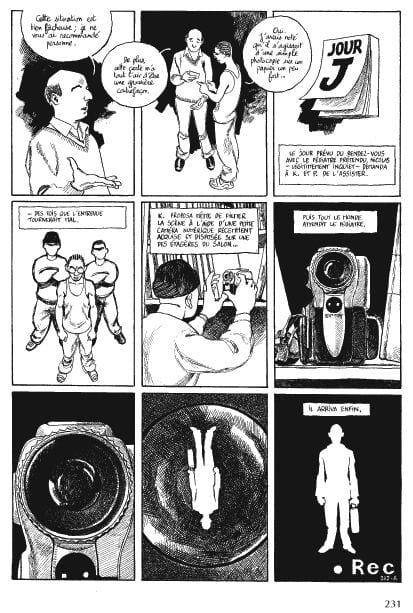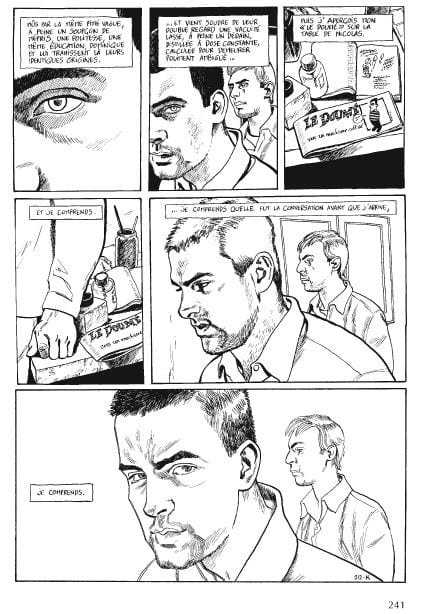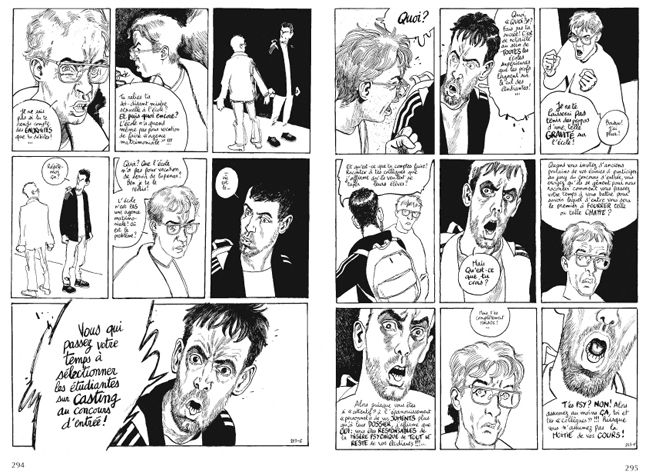 Received wisdom tells us that returning to a masterwork is ill advised. It almost invariably upsets the delicate balance of elements that made the work resonate in the first place. Nevertheless, that is what French cartoonist Fabrice Neaud did in 2009 when he released a so-called "augmented" version of his great autobiographical work Journal 3, first published in 1999.
Received wisdom tells us that returning to a masterwork is ill advised. It almost invariably upsets the delicate balance of elements that made the work resonate in the first place. Nevertheless, that is what French cartoonist Fabrice Neaud did in 2009 when he released a so-called "augmented" version of his great autobiographical work Journal 3, first published in 1999.
Neaud was not done with the story. He had originally censored himself out of anxiety about what would happen if he did not, and perhaps he even lacked the clarity of retrospection gained only with maturation. So while one might dispute the general wisdom of such a move, or point out the inevitable stylistic incongruities caused, it is hard to argue against the resultant thematic and conceptual enrichment of the book.
This interview was conducted at the 2010 Angoulême festival, at which Neaud’s work was the object of a retrospective exhibition. It probes the above-mentioned questions, and will hopefully simultaneously serve as a primer on this pioneer in comics autobiography for readers unfamiliar with his work, opening up the discussion as it does, to encompass questions of representation, authenticity, and consequence in reality-based comics.
A little background: Neaud, born in 1968, graduated from art school in 1991. He was one of the co-founders of the autobiography-oriented Angoulême-based comics group and publisher Ego comme X, in whose eponymous revue he started publishing his ongoing comics diary in 1994. As it progressed, most of these comics were collected in four books, entitled Journal, from 1996-2002.
The third volume is the biggest in the series, and also the most complex, conceptually as well as emotionally. Briefly, it narrates events of a year-and-a-half in its author’s life, centering on his unrequited love for a man, a friend, who in the book is called Dominique. Neaud engages inquisitively, but also immersively, the emotional turmoil caused by such an irresolvable situation.
What is more, he weaves the portrayal of his relationship with Dominique and his circle of friends into a greater social context of heteronormativity. By detailing the personal consequences of his love and his impulse creatively to express it – first in a parody comic, since in a sheaf of brutally honest symbolic comics pages that he hands to Dominique as if it were a loaded gun – Neaud manages to expand his particular experience to encompass that of being regarded, and regarding oneself, as an other because of one’s sexuality – an experience that at any moment can lead also to anonymous brutalization. In short, his scope is political as much as it is personal.
Since 2002, Neaud has more or less stopped publishing diaristic comics. His most sustained effort outside his now interrupted book series remains the novella-length “Émile” of 2000 (available in English here). As a consequence in part of what he had lived with Dominique, this story sees him omitting entirely drawings of people, including the man whose name adorns the title. He does this to illustrate by absence the personal consequences of appropriating another person’s image in art, exacerbated in Neaud’s case because of his naturalistic rendering style, heavily based on photo reference, which seeks to capture likenesses in detail.
While the implications of depicting Dominique and his friends, as well as Émile, were primarily personal, Neaud has since run into legal problems. As he told the audience at a stage appearance the day before this interview, one particular affair had led to a court injunction against his drawing the person in question, as well as various extra-legal threats more ominous in character. He described this as a crisis in his life and work, not only making it difficult, if not impossible, for him to continue his most important artistic project, but also to continue living in Angoulême, where in some ways he was starting to feel like persona non grata.
It is my hope that the reader will enjoy this candid conversation, and that it will help bring to the attention of a broader English-speaking readership the work of this major artist in comics, so far woefully neglected by English-language publishers. My thanks to Neaud and his publisher at Ego comme X, Loïc Néhou, for their patience and assistance.
---
I specifically wanted to talk about the "augmented" version of Journal 3 – the decision to return to this work and add scenes.
OK, when Journal 3 was first published ten years ago, I already knew that there were parts that I wanted to correct and others that I wanted to add. Most importantly, there’s a scene in the original version – there was this one image, along with which I told an anecdote in captions, in just one panel. My impression was that most readers missed the importance of that part because it was too short. It is a very important scene. At the time, I decided not to draw it out because it was too fraught and I was afraid that it would cause even more problems with the people concerned. So I censored myself. But I knew from the beginning that it needed more space and I knew that I had to tell that story in full one day.
In addition to that, there’s a scene in the beginning with a sergeant that I met, which ends a little abruptly, without any depictions of sex. So again I wanted at an early stage to complete that scene, that is depict the sex.

The video
I also expanded the scene with a professor that I have a violent argument with by three or four pages, in order to support the other expanded scene I talked about—what I call “the video scene.” It was extremely important since it concerned people who had criticized me because I had drawn them without their consent, as you see in the book, and for that reason it was morally unacceptable to me. Around the same time, these same people tricked somebody with a video camera, somebody who had lied about who he was, presenting himself to a young student as a health professional. It is clear that he was trying to seduce this young man in a rather awkward – let’s say “borderline” – way. And this young man, entirely justifiably, felt this to be transgressive and wanted to prevent things from going any further. So he decided to have a couple of friends present at their agreed meeting and have them film the man, in case there was going to be trouble. So they filmed him and it went well: the man arrived and saw that there were others present besides the guy he wanted to seduce and he quickly explained that there was a misunderstanding and went away.
But these young men were angry and started imagining wild things about what could have happened. They watched the video repeatedly, stoking their anger, and went out and came across the guy again and threatened him that they were going to report him to the police. Which is what they ended up doing, and they showed to video to the police as well. The young guy concerned, Nicholas – the victim – ended up choosing not to press charges.
The story might have ended there. As a forgettable anecdote. But the problem is that this video was still around. These young guys started showing it to a lot of people, other students like themselves. They ended up organizing a viewing… I don’t have proof, I don’t know exactly how it happened, but I know that certain professors watched the video along with a number of students, as if it were part of a class.
As a work of art.

Yes. I wasn’t part of it, of course, but I was having problems at the time with Dominique because I’d taken photos of him and wanted to draw him, and because I’d published this minicomic “Le Doumé”, which had offended a lot of people. So this affected me, and I started telling them ‘what you’re doing is unacceptable, you’re doing a horrible thing, you’re taking advantage of someone to humiliate him, and even if the person in question is unaware of it, it’s really transgressive.’ Of course, they all told me that my reaction was understandable because I was homosexual. I responded that to go to the police was a normal, completely fair reaction, but to start promoting the video around the school as if it were a reality clip – something that didn’t exist at the time – of the kind you see all the time on YouTube or DailyMotion… To me, that was absurd, morally – even more so because these people had criticized me for my work. So that is an important scene in the book.

And it becomes central to your larger political argument.
Yes, precisely. There were already political elements in the book, but with the expansion of this anecdote, it becomes much more evident. The political perspective is much stronger. It presents the lone view of a person in opposition to that of a group, which considers itself the norm and which regards the other from the outside as if he is not normal. I add to this an historical perspective on homosexuality in France, and especially around the time of the events described in the book. I explain how homosexuality was only depenalized in France in 1980, a mere thirteen years before the events described in the book. A very short time. This may help explain the actions of this person – he may have been a little deranged and didn’t know how to go about seducing a young man. He was psychologically constituted by guilt engendered by a homophobic society. He was around fifty years old and must have been about thirty-seven in 1980, which means that through his entire childhood and youth he would have felt guilt for being homosexual. It’s an hypothesis: basically what I’m saying is that this kind of societal order can only produce victims, and this particular episode was a result of the homophobia of an entire generation.
The expansion of this scene also leads you to add to the scene with the professor…
Yes, right.
…it becomes even more of a political manifestation than in the original.
Yes, an accusation.
And it already had a very strong political edge.
Yes, it’s good that you’ve noticed, because in France very few people picked up on this dimension. That’s another reason why I revised the book, even if I doubt that it’s going to change the perception of many here in France. But as I said earlier, I was very happy to read the article [by Bart Beaty] that you [The Comics Journal #241] did on the book, because it was one of the only articles that viewed my work from a political perspective. Comics people in France who read my work have a tendency to overlook this and focus solely on the psychological portrayal of the narrator, which again enables them to isolate him somewhere in the orbit of the mentally aberrant –just as happened with this man on the video. We have somebody who is homosexual and unhappy, who is a victim, who is angry and wants to strike back, and therefore makes a book in which he accuses people who don’t feel involved. In France there is a total denial of this very rational and carefully formulated discourse, this analysis of social behavior. But the Anglo-Saxons, with Mr. Beaty, noticed it, I’m happy to say.
So yes, I’ve added a very strong accusation, saying, "no, we’re not isolated people to whom similar things happen at random – there’s a system of thought, a dominant ideology that forces us to act in certain ways." And in the cases of the school, this accusation is particularly forceful because the narrator – that is, me – accuses the school system itself of being responsible for the emotional and sexual pain of some of its students. This is a serious charge, which seemed absurd to the professors and to the French readership – the ranting of a madman. But in spite of my obvious involvement in the matter and everything else, I believe there’s some truth to it that these people are unable to see. I don’t know whether this is the impression that the reader…

Well, it’s exactly that. I wanted to ask you: that scene with the professor is a construction…
Yes.
I didn’t happen like that. Did you worry about inserting something that obviously constructed?
Didactic?
Yes.
On what level?
In relation to the very lived aspect of large parts of the Journal. It’s in a different register.
That scene is made up, it’s a lie; it never happened. Just like Dominique’s big monologue at the end, which also didn’t happen like that – it is a synthesis of three different conversations with Dominique. The argument with the professor is similar: it’s the result of three, four, five conversations with people from the art school, students as well as professors. It’s a synthesis. My character says very hard things that I wasn’t actually able to say at the time because I was too angry – I wasn’t capable of the analysis I bring to it in the book. I was when I first wrote it, but didn’t dare to include such strong accusations, basically saying clearly to the professors "you are responsible for the psychological state of the students because you admit female students based on their looks. Your selection is far from an objective consideration of the quality of their work, it is based on sex." And that is reprehensible, and all the more so because it’s accepted. And I know it’s true: I know a number of former students who sat on admissions committees there, all of whom have witnessed this kind of thing going on. So there you are.






